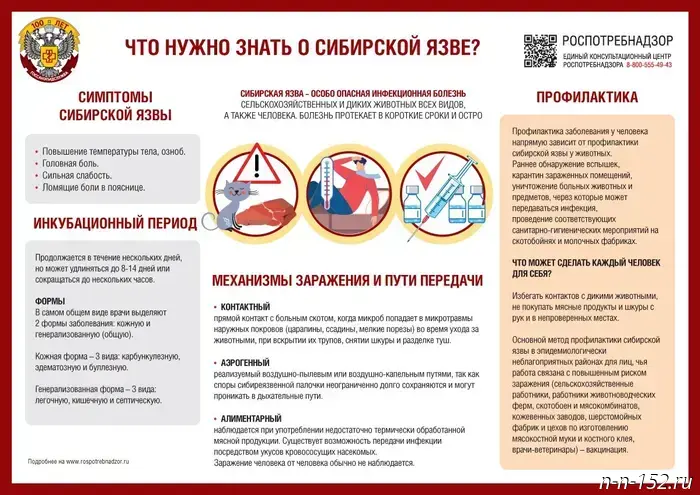
Memorandum for the Population "Prevention Measures for Anthrax"
Anthrax is one of the most dangerous infectious diseases affecting animals and humans, with a very high mortality rate. The causative agent of anthrax is a spore-forming bacterium that is resistant in the environment. Microbial spores tolerate cold, heat, and can survive in soil for 100 years or more. Boiling kills anthrax spores only after 45-60 minutes.
Source of the pathogen is a sick animal, excrement of diseased animals (feces, urine, blood discharge from natural openings), as well as contaminated soil and other objects in the environment with anthrax spores.
To prevent the disease or to take necessary measures, you should know how it manifests in animals and humans.
In animals, anthrax occurs in the gastrointestinal form, characterized by bloody discharges from the nose, rectum, fever, and loss of appetite.
In humans, it appears as gastrointestinal, pulmonary, and skin forms. Most often (98 out of 100 cases), humans develop the skin form. Infection occurs through contact with the pathogen via broken skin or mucous membranes of the eyes, mouth, or nose. The incubation period from infection to symptoms ranges from several hours to 8 days, most commonly 2-3 days. An erythematous spot appears at the entry site, resembling a bug bite. Then, a blister filled with bloody fluid forms, quickly developing into a black crust.
Ways of human infection with anthrax:
- contact,
- alimentary (via food and water),
- airborne-particle,
most often during care for a sick animal, during forced slaughter of livestock from carcasses of dead animals, or consuming insufficiently processed meat products from sick animals. Infection can also occur through raw animal products (wool, down, leather, fur, etc.).
To prevent infection with anthrax, follow these rules:
- Immediately call a veterinarian if any illness occurs in a domestic animal;
- Do not force slaughter animals without veterinarian approval;
- Strictly observe personal hygiene when caring for sick animals;
- Wash hands thoroughly after contact with animals, and use special clothing for caring for sick animals;
- Ensure timely vaccination of livestock against anthrax in private farms;
- People with a real risk of infection (veterinarians, workers in sheepskin and fur factories) should not refuse preventive vaccinations;
- In case of suspicion of anthrax, seek medical help immediately.

Другие Новости Нижнего (Н-Н-152)
 The operator was injured while inflating a tire in the Nizhny Novgorod region.
News of Nizhny Novgorod
The operator was injured while inflating a tire in the Nizhny Novgorod region.
News of Nizhny Novgorod
 They finished him off. The Gypsies beat up the man from Nizhny Novgorod after a terrible accident.
Gypsies hit a Nizhny Novgorod biker and then beat him to death. Rostov Gypsies caused a deadly accident with a Nizhny Novgorod biker and then mocked the dying. 26.07.2025. NewsNN.Ru. Nizhny Novgorod Region. Nizhny Novgorod.
They finished him off. The Gypsies beat up the man from Nizhny Novgorod after a terrible accident.
Gypsies hit a Nizhny Novgorod biker and then beat him to death. Rostov Gypsies caused a deadly accident with a Nizhny Novgorod biker and then mocked the dying. 26.07.2025. NewsNN.Ru. Nizhny Novgorod Region. Nizhny Novgorod.
 A triplet was born in the Arzamas district for the first time since 2016.
News of Nizhny Novgorod
Citizen reception week on education issues will be held in Dzerzhinsk.
From July 28 to August 1, City Duma deputies, activists of the "New School" party project, and the All-Russian public movement "Fathers of Russia" will answer questions related to education. 26.07.2025. Dzerzhinsk Gazette. Nizhny Novgorod Region. Dzerzhinsk.
A triplet was born in the Arzamas district for the first time since 2016.
News of Nizhny Novgorod
Citizen reception week on education issues will be held in Dzerzhinsk.
From July 28 to August 1, City Duma deputies, activists of the "New School" party project, and the All-Russian public movement "Fathers of Russia" will answer questions related to education. 26.07.2025. Dzerzhinsk Gazette. Nizhny Novgorod Region. Dzerzhinsk.
 Emergency demographic assistance
Psychological support will be provided to women in the Nizhny Novgorod region who are facing postpartum depression, fertility issues, family crises, or other life situations. 24.07.2025. Day City Newspaper. Nizhny Novgorod. Nizhny Novgorod Region. Nizhny Novgorod.
Emergency demographic assistance
Psychological support will be provided to women in the Nizhny Novgorod region who are facing postpartum depression, fertility issues, family crises, or other life situations. 24.07.2025. Day City Newspaper. Nizhny Novgorod. Nizhny Novgorod Region. Nizhny Novgorod.
 Over 305,000 residents of Nizhny Novgorod received dispensary care in 2025.
News of Nizhny Novgorod
Over 305,000 residents of Nizhny Novgorod received dispensary care in 2025.
News of Nizhny Novgorod
Memorandum for the Population "Prevention Measures for Anthrax"
Anthrax – one of the most dangerous infectious diseases of animals and humans with very high mortality. 25.07.2025. Rospotrebnadzor. Nizhny Novgorod Region. Nizhny Novgorod.
